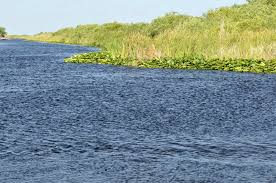Estuary Restoration is Paramount for Manatees!
Greetings! Did you know that a manatee’s habitat relies on estuaries? It’s true. Estuaries, along with their surrounding wetlands are actually bodies of water. And they are mostly found where rivers meet the sea. Estuaries are home to unique plant and animal communities, which have adapted to brackish water – a blend of fresh water draining from the land into salty open seawater. And according to NOAA, “Estuaries are also the nursing grounds for 75% of the fish we catch. And they are among the most productive ecosystems in the world. Many animals rely on estuaries for food, places to breed, and migration stopovers.”
Dr. Katie Tripp, Director of Science and Conservation, for the Save the Manatee Club explains,“Since November 2016, we have been planning a large-scale estuarine restoration project in a Florida community that is regularly visited by manatees during warmer weather. More than half of the 5,800-acre urban Rose Bay watershed in East Volusia County is developed. Rose Bay benefitted from two decades of restoration activities that removed septic tanks and connected the adjacent Harbor Oaks community to sewer,
replaced causeways with full span bridges to increase flow, and removed muck. As a result of that $50 million project, which ended in 2012, Rose Bay water quality improved and shoreline habitats began to recover.”
Dr. Tripp continues and said, “However, intertidal areas remain degraded along the hard-armored northern shoreline. Like many coastal communities, Harbor Oaks is grappling with sea level rise. The purpose of the subject restoration project is to provide this community’s residents the opportunity to continue a legacy of supporting the bay by moving restoration efforts onto their own properties. Specifically, the methods to be used are exotic vegetation control, debris removal, storm water conveyance retrofit (achieved via installation of rain barrels, rain gardens, and/or backyard buffer areas), living shoreline creation in the intertidal zone waterward of any existing hard armoring, and long-term community-led monitoring and maintenance.”
If you are in Florida and you see a sick or injured manatee, please call the Florida Fish and Wildlife Conservation Commission at: 1-888-404-FWCC. They are the folks who are responsible for rescuing us in Florida.
Here’s the Save the Manatee Clublink to learn more about manatees …
Here’s a cool link for you to learn more about how we’re rescued and brought into rehabilitation …
~ Kobee Manatee
